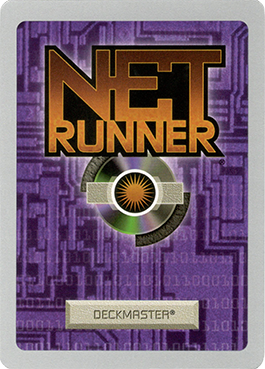
Netrunner is an out-of-print collectible card game (CCG) designed by Richard Garfield, the creator of Magic: The Gathering. It was published by Wizards of the Coast and introduced in April 1996. The game took place in the setting for the Cyberpunk 2020 role-playing game (RPG), but it also drew from the broader cyberpunk genre.

In collectible card games, digital collectible card games and collectible miniature wargames, a booster pack is a sealed package of cards or figurines, designed to add to a player's collection. A box of multiple booster packs is referred to as a booster box.
Star Wars: Customizable Card Game (SW:CCG) is an out-of-print customizable card game based on the Star Wars fictional universe. It was created by Decipher, Inc., which also produced the Star Trek Customizable Card Game and The Lord of the Rings Trading Card Game. The game was produced from December 1995 until December 2001. Since 2002, the game has been maintained by the Star Wars CCG Players Committee, with new virtual cards being released every few months and the capability to play both in person and online.
An expansion pack, expansion set, supplement, or simply expansion, is an addition to an existing role-playing game, tabletop game, video game, collectible card game or miniature wargame. These add-ons usually add new game areas, weapons, objects, characters, adventures or an extended storyline to an already-released game.
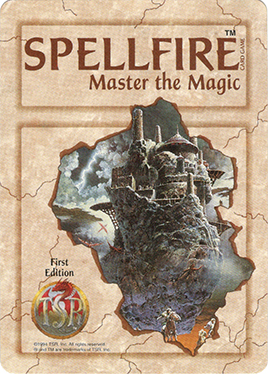
Spellfire: Master the Magic is an out-of-print collectible card game (CCG) created by TSR, Inc. and based on their popular Dungeons & Dragons role playing game. The game appeared first in April 1994, shortly after the introduction of Magic: The Gathering, in the wake of the success enjoyed by trading card games. It was the second CCG to be released, preceding Wizards of the Coast's second CCG Jyhad by two months. More than one dozen expansions for the game were released, and the final expansion was released in October 1997.

The Babylon 5 Collectible Card Game is an out-of-print collectible card game set in the Babylon 5 universe. The game is ideally set for 4-5 players but can be played with a minimum of two players up to as many as 20 if using multiple Non-Aligned Factions and Home Factions. This CCG is distinct from most others of the genre for being specifically designed to be played by more than two players. The gameplay tends to have strong political elements encouraging significant player interaction aka "table talk" which is appropriate for a game based on a series which featured such a strong element of political intrigue. During its six-year existence under the Precedence Entertainment banner it released two core sets, five expansions sets and one revision set. There were two World Championships during that time. The game still continues to have a cult following as further expansions were made available online.

A Game of Thrones: The Card Game is an out-of-print collectible card game produced by Fantasy Flight Games. It is based on A Song of Ice and Fire, a series of novels written by George R. R. Martin. The first set was Westeros Edition and was released in August 2002. It has since won two Origins Awards. The game's primary designer is Eric Lang, the lead developer is Nate French, with Damon Stone serving as associate designer.
Vampire: The Eternal Struggle is a multiplayer collectible card game published by White Wolf Publishing. It is set in the World of Darkness and is based on the Vampire: The Masquerade roleplaying game.

Call of Cthulhu: The Card Game is an out-of-print card game produced and marketed by Fantasy Flight Games. It is based on Chaosium's Call of Cthulhu role-playing game, the writings of H. P. Lovecraft, and other Cthulhu Mythos fiction. In 2008, Fantasy Flight moved the game over to its Living Card Game (LCG) format, which retains the deck-building aspect of collectible card games, but without the random distribution.
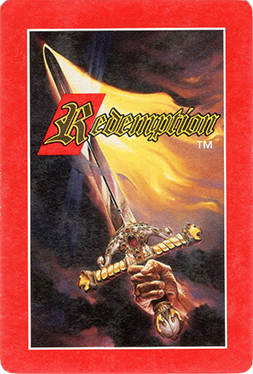
Redemption is a collectible card game based on the Bible. It involves Biblical characters, places, objects, and ideas. The object of the game is for players to use their Heroes to rescue Lost Souls by defeating their opponent's Evil Characters, with the first player to rescue five Lost Souls winning the game. Redemption was first published in July 1995 by Cactus Game Design and its creator, Rob Anderson, continues to develop and produce the game and is the final authority on rulings.

Dragon Ball Z Trading Card Game is an out-of-print trading card game based on the Dragon Ball series created by Akira Toriyama. The game was produced by Score Entertainment and uses screen captures of the anime to attempt to recreate the famous events and battles seen in the anime. Score then sold the rights to Panini which eventually ceased publishing.

The X-Files Collectible Card Game is an out-of-print collectible card game based on The X-Files fictional universe. The game was developed by NXT Games and published by the US Playing Card Company (USPCC) in 1996. The game was canceled in early 1998.

Galactic Empires is an out-of-print collectible card game with a science fiction theme. It was published by Companion Games in 1994 until the company's bankruptcy in 1997.

Battlestar Galactica Collectible Card Game is an out-of-print collectible card game based on the Battlestar Galactica science fiction media franchise. The game, published by WizKids, saw first release in May 2006 and was officially canceled in March 2007.
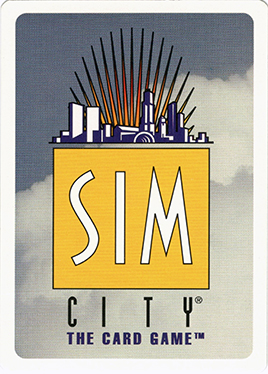
Sim City: The Card Game is an out-of-print collectible card game based on the video game SimCity by Maxis. The goal of the game is to build a city from the ground up. Players take turns playing cards representing city blocks and collect profit.

The Buffy the Vampire Slayer Collectible Card Game is an out-of-print trading card game based on Buffy the Vampire Slayer. It was released in December 2001 by Score Entertainment. As of January 2004, Score Entertainment no longer holds the rights to this game. Hence, no further production runs or expansions for the game are planned.
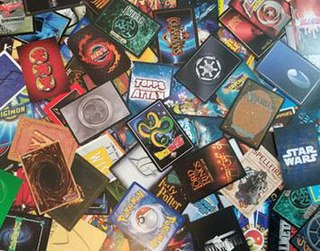
A collectible card game (CCG), also called a trading card game (TCG) among other names, is a type of card game that mixes strategic deck building elements with features of trading cards. It was introduced with Magic: The Gathering in 1993.
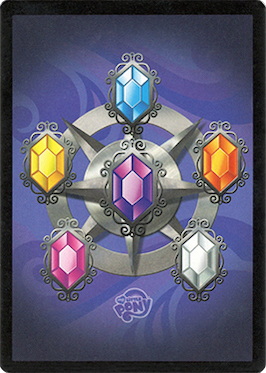
The My Little Pony Collectible Card Game is a two-player collectible card game based on the animated television series My Little Pony: Friendship Is Magic. It is produced by Enterplay LLC under license from Hasbro, and follows from Enterplay's previous work to produce a trading card series based on the same show.

A digital collectible card game (DCCG) or online collectible card game (OCCG) is a computer or video game that emulates collectible card games (CCG) and is typically played online or occasionally as a standalone video game. Many DCCGs are types of digital tabletop games and follow traditional card game-style rules, while some DCCGs use alternatives for cards and gameboards, such as icons, dice and avatars. Originally, DCCGs started out as replications of a CCG's physical counterpart, but many DCCGs have foregone a physical version and exclusively release as a video game, such as with Hearthstone.
Magic: The Gathering finance or MtG finance is the financial management and investment as it pertains to the collectibility and playability of the Magic: The Gathering collectible card game. Investments are typically made in single cards whose value are expected to rise over time such as from a shifting metagame or low quantities of cards that may or may not increase in value due to a growing playerbase and their demand. Like the stock market, cards are generally bought at a low price and/or are sold at a higher price during peak demand at a later date. Speculation is common as investors seek to predict which of 20,000+ unique cards will avoid a reprint thereby creating more demand. Speculation also occurs in the selling of card assets when a reprint is expected in an effort to maximize financial gain and minimize loss. Most financing is done through the buying and selling of cards, though some investors have traded their way to cards of higher value, or expected to gain value in the future. Additionally, some speculators have gone as far as manipulating the market by buying up large quantities of a single card in order to artificially inflate a card's price.















